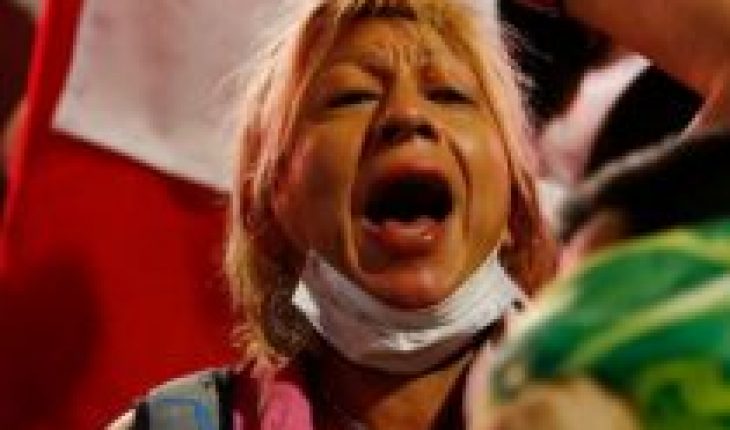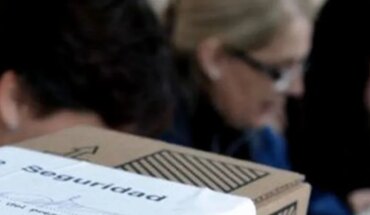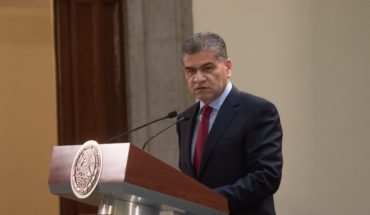For Cristóbal Bellolio, doctor in Political Philosophy and professor at the Adolfo Ibáñez University, the victory of Kast, who openly sympathizes with the de facto government of Augusto Pinochet, sharpens “the contradictions in a very unusual way, because one would expect that after the social explosion, which had leftist demands, it would be capitalized by the group that most identifies with those demands.”
“What nobody expected is that a more conservative, more reactionary and nationalist right would be the one that wrote down his name in the second round. Because a lot of people expected the post-Pinochet right to be more liberal, more centrist, more moderate.”
So it was with the piñera governments, whose legacy, taken by Sichel in these elections, was surpassed by the extreme.
2. The surprising “outsider” that can be key
The big surprise of election night was the third place of Franco Parisi, a liberal economist who has campaigned from the United States, without setting foot in the country and whom several analysts define as populist.
But not only was he not in the campaign, but he has not returned to Chile for two years. There is a lawsuit against him for not paying child support, which would prevent him from leaving the country if he decided to enter. But Parisi denies that’s why.
That did not prevent it from being the third most voted force behind Kast and Boric, and ahead of Sichel and Provoste with 12.80% of the support.
Franco Parisi carried out his campaign through social networks, without stepping on Chilean soil. Credit: GETTY IMAGES
Although it is difficult to do direct mathematics, it is to be expected that the center-right will lean towards Kast, while the center-left will lean towards Boric. But what will Parisi’s voters do?
Although his social postulates do not coincide with Kast’s conservatives, there are parallels with economic policies. It is possible that you will define your supports for the second round through a digital consultation.
The 12.80% is three points better than what Parisi achieved in the 2013 presidential elections.
Its success was based on a strong digital campaignl with content on own channels and social networks, and with a critical discourse with the political class that, as in many parts of the world, also resonates successfully in Chile.
“He is a candidate who knew how to position himself very well in a populist, anti-political discourse and aimed at those who reject the center-left and right-wing parties in the same way,” says political scientist Javier Sajuria.
“That is, people who do not commune with the traditional parties or with the system in general,” adds the expert, in a climate in which the social explosion turned around the political status quo of Chile.
Kast and Boric are the proof of this, but also the atypical Parisi, whose votes may be the key to the runoff.
3. North turn right
The north of the country, which was a traditional center-left stronghold, confirmed in this election the turn to the right at a time of great migratory tension in the area.
In Arica and Parinacota, the northernthest region, the most voted were Kast and Parisi. The same in Tarapacá; and in Antofagasta Parisi won, followed by Kast.
“There were already hints of that turnaround in 2013. Are mining areas, where the State is non-existent and there is a floating population of high resources, for the salaries of mining, but of manual labor. Individual effort takes precedence over state support, and that discourse works well with Parisi,” says Sajuria.
For days Colchane, a small commune in Chile, has been experiencing an “unprecedented” migration crisis. Credit: GETTY IMAGES
Both in Arica and tarapacá the migration crisis it has been a key electoral issue given that it has been the sectors that have suffered the most from the rise of migrants who have entered through unauthors, especially Venezuelans.
Kast even advocates the construction of a ditch and has made migration the strong point of his campaigns. He visited the town of Colchane, the epicenter of the migratory tension.
Parisi, for his part, proposes a reinforced border control between the Police and the Armed Forces and deport those who commit crimes.
In the northern regions of the country are found the richest copper deposits, of which Chile is the world’s largest producer, and where life is very expensive and there are differences in income between mining workers and the rest of the population that have not been able to shrink the successive governments of the traditional parties.
“In the north there is a greater disenchantment with the Parties.traditional politicians,” Rodrigo Espinoza, an analyst at Diego Portales Espinoza University, told AFP.
A key for Boric to prevail over Kast is to convince Parisi voters in those northern regions to try to regain the advantage with which the right-winger starts in the face of the first round.
4. The right ties in the Senate (and the surprise return of the PC)
Whoever the next president of Chile is, the political conformation of the Parliament will be of vital importance.
Despite the poor performance of the candidates Sichel and Provoste – who obtained the fourth and fifth place in the presidential elections, respectively – both the center-right and the center-left managed to maintain their hegemony in the Upper House.
But it was especially surprising the triumph of the right, which managed to reach the 25 senators, equivalent to half of the Senate (50%), a scenario unprecedented since 1990.
Credit: GETTY IMAGES
To the official pact “Chile Podemos Más”, it was added Red Edwards, a candidate of the Republican Party, by José Antonio Kast.
This data is relevant, considering that if the left managed to reach La Moneda, it would find here an important counterweight in its proposals,
Currently, the center-right conglomerate has 19 senators, equivalent to the 44%. According to the newspaper La Tercera, the sector expected to maintain its relative weight (and, at most, increase its presence to 46% at best), but the results were much more auspicious.
For its part, the center-left managed to remain the second force in the Senate, with a total of 18 senators.
However, another surprise was the performance of the Communist Party who managed to return to the Senate (with Claudia Pascual and Daniel Núñez), where they did not have a representative since 1973.
In the Chamber of Deputies, meanwhile, the Communists also achieved a favorable advantage by winning 11 seats, confirming their influence in the conglomerate Apruebo Dignidad, which supports Gabriel Boric.
In any case, it is important to emphasize that neither the eventual government nor its opposition will have a majority in the Lower House.





